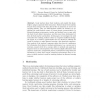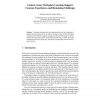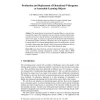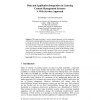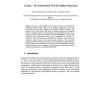109
click to vote
ECTEL
2006
Springer
15 years 5 months ago
2006
Springer
Abstract. This contribution introduces the so-called Workplace Learning Context as essential conceptualisation supporting self-directed learning experiences directly at the workpla...
ECTEL
2006
Springer
15 years 5 months ago
2006
Springer
114
click to vote
ECTEL
2006
Springer
15 years 5 months ago
2006
Springer
Abstract. Good teachers know their students, and exploit this knowledge to adapt or optimise their instruction. Teachers know their students because they interact with them face-to...
ECTEL
2006
Springer
15 years 5 months ago
2006
Springer
Abstract. There are specific sectors of the economy that can benefit from satellite-based tele-education. Areas, such as maritime and agriculture, share common needs for both broad...
ECTEL
2006
Springer
15 years 5 months ago
2006
Springer
Workplace learning offers the unique possibility of the immediacy of purpose and real-world context. In order to leverage on this, we have developed a context-aware method to suppo...
117
click to vote
ECTEL
2006
Springer
15 years 5 months ago
2006
Springer
Abstract. Given the huge amount of static and dynamic content created for eLearning tasks, the major challenge for extending their use is to improve the effectiveness of retrieval ...
ECTEL
2006
Springer
15 years 5 months ago
2006
Springer
Abstract. The generalization of game-based Learning Objects as serious learning material requires their integration into pre-existing e-learning infrastructure (systems and courses...
119
click to vote
ECTEL
2006
Springer
15 years 5 months ago
2006
Springer
Abstract. Current e-learning standards have been designed to provide reusability of educational contents and interoperability between systems. Besides these features, content perso...
128
click to vote
ECTEL
2006
Springer
15 years 5 months ago
2006
Springer
This paper describes a service-oriented approach for the integration of third-party external applications and resources into an existing open source eLearning environment. We detai...
114
Voted
ECTEL
2006
Springer
15 years 5 months ago
2006
Springer
iCamp is an EC-funded research project in the area of Technology Enhanced Learning (TEL) that aims to support collaboration and social networking across systems, countries and disc...

